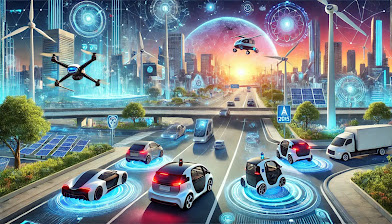Driving the Future: Innovations in Technology and Automobiles
The world of technology is advancing at an unprecedented pace, continuously reshaping industries and the way we live. In 2025, several cutting-edge innovations are making waves, promising to redefine the future. Let’s dive into some of the most exciting technological advancements that are capturing global attention.
1. Artificial Intelligence and Machine Learning
Artificial Intelligence (AI) continues to dominate the tech landscape, with machine learning (ML) models becoming more sophisticated and capable. Generative AI tools, such as ChatGPT-5 and DALL-E, are enabling unprecedented creativity and problem-solving abilities. These models are now widely used in industries like healthcare, finance, and entertainment for tasks ranging from diagnostics to content creation.
In healthcare, AI-powered algorithms are revolutionizing drug discovery and patient care. Predictive analytics tools can now detect diseases at earlier stages, while robotic-assisted surgeries are becoming increasingly precise and common.
2. Quantum Computing
Quantum computing is no longer a theoretical concept but a rapidly evolving technology. Companies like IBM and Google have achieved significant breakthroughs, bringing quantum supremacy closer to reality. These computers promise to solve problems that are currently impossible for classical computers, including optimizing complex logistics networks and accelerating material science research.
3. Sustainable Energy Technologies
The shift toward renewable energy has gained momentum, with new advancements in solar, wind, and energy storage technologies. Solid-state batteries, for instance, are transforming the electric vehicle (EV) market by offering higher energy densities and faster charging times. Additionally, innovations like perovskite solar cells are making renewable energy more efficient and affordable.
4. Extended Reality (XR)
Extended Reality (XR), which includes Virtual Reality (VR), Augmented Reality (AR), and Mixed Reality (MR), is making strides in gaming, education, and professional training. Meta’s new XR headset and Apple's Vision Pro have pushed the boundaries of immersive experiences, providing users with unparalleled levels of interactivity and realism.
Industries such as architecture and healthcare are also leveraging XR for design visualization and surgical simulations, respectively. As hardware becomes more affordable, XR is expected to become mainstream in various sectors.
5. 5G and Beyond
5G networks have already started transforming global connectivity, enabling faster internet speeds and ultra-low latency. However, researchers are already looking toward 6G, which is expected to further revolutionize wireless communication. This next-generation network will enhance capabilities for AI-driven applications, autonomous vehicles, and smart cities.
6. Biotech and Genomics
Advancements in biotechnology and genomics are opening new doors for personalized medicine. Technologies like CRISPR are enabling precise genetic editing, allowing for the treatment of previously incurable genetic disorders. Meanwhile, advancements in synthetic biology are paving the way for sustainable alternatives to traditional manufacturing processes, including lab-grown meat and biofuels.
7. Autonomous Systems
Autonomous systems, from self-driving cars to delivery drones, are becoming increasingly sophisticated. Companies like Tesla, Waymo, and Amazon are leading the charge, with new innovations ensuring safer and more efficient autonomous operations. The integration of AI with edge computing is accelerating the development of these technologies, making them more reliable and accessible.
The Future of Automobiles: Driving into Tomorrow
The automobile industry is undergoing a technological revolution, driven by electrification, automation, and connectivity. In 2025, vehicles are not just modes of transportation but integrated ecosystems of technology.
1. Electric Vehicles (EVs)
The shift to electric vehicles continues to accelerate, with major automakers unveiling new models with extended ranges and faster charging capabilities. Innovations in battery technology, such as solid-state batteries, are reducing costs and increasing energy efficiency. Governments worldwide are implementing incentives and infrastructure improvements to support the EV transition.
2. Autonomous Vehicles
Self-driving cars are becoming a reality, thanks to advances in AI and sensor technology. Companies like Tesla, Waymo, and Cruise are leading the charge, testing fully autonomous vehicles in urban and highway environments. These vehicles promise safer roads, reduced congestion, and increased accessibility for people with disabilities or limited mobility.
3. Connected Cars
The integration of 5G and IoT technologies is enabling cars to communicate with each other and with infrastructure. These connected vehicles can optimize traffic flow, provide real-time navigation updates, and enhance driver safety. Smart dashboards with voice assistants and augmented reality displays are also transforming the driving experience.
4. Sustainability in Manufacturing
Automakers are adopting sustainable practices, from using recycled materials to reducing emissions in manufacturing processes. Advances in hydrogen fuel cell technology are also providing alternative solutions for long-haul transportation and commercial vehicles.
5. Mobility as a Service (Maas)
Ride-sharing and subscription-based car services are reshaping urban mobility. Companies are offering flexible options for users who prefer access over ownership, reducing the environmental impact and improving urban planning.
The Road Ahead
The future of automobiles is not just about getting from point A to point B. It’s about creating a smarter, greener, and more connected transportation ecosystem. With continued innovation, the automobile industry is set to play a pivotal role in shaping the cities and lifestyles of tomorrow.




